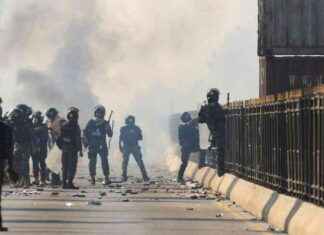40 years Ago, when they approved the Constitution, the writer Soledad Puértolas had just turned 30. “What I remember from then,” said this Tuesday in the Auditorium of the University of Salamanca, “is that the idea of the Constitution was not in the environment. The words that were on the banners were freedom and democracy. Yes, we felt that we were on the right road, and that some gentlemen of very diverse origins had become amazingly according. Now I know that he was fighting for the Constitution without knowing it and I am very proud. What you need to do now is to continue betting on the strange case of agreeing,” concluded the writer.
MORE INFORMATION
the 40th anniversary of the Constitution put in the first row at Juan Carlos I The King’s House will give this time a special place to Juan Carlos I on the 40th anniversary of the Constitution
The intervention of Puértolas occurred during the act of Conversation on the 40th anniversary of the Spanish Constitution, organized by the Junta de Castilla y León, University of Salamanca, City of Salamanca, and THE COUNTRY, with the collaboration of Radio Salamanca, of the string to BE. Before had been the president of an autonomous region, Juan Vicente Herrera, who, in a fiery speech in defense of the constitutional text, not only said that the 78 is “the best Constitution in history,” but that “it continues to form part of the solutions that Spain needs”. Herrera added: “Despite the willingness of some to send it to the trash bin of History, the genesis of our Constitution was flawless. The Transition was not the daughter of the lack of memory, but a clear awareness of the mistakes of the past, and an explicit desire not to go back to them. The Constitution wasn’t the whim of a few elites behind the backs of the people, but desired by this, and elaborated in a participatory process that scholars have been able to follow and dissect. Does not give rise to a so-called regime of 78, but to a democracy at all comparable to that of the more developed countries. It was endorsed overwhelmingly by the Spanish people, that it has had occasion to pronounce, with normality and transparency, Betebet in more than 200 democratic electoral processes”. The president of the Junta de Castilla y León added that, “in the face of falsehoods, revisionist repeating”, the values and principles of the Constitution —freedom, equality, justice, pluralism, separation of powers…– “remain infinitely superior to what is proposed by those who criticize”.
For his part, the mayor of Salamanca, Alfonso Fernandez Mañueco, called attention to the cheers —the legends printed with the blood of the bull next to the classroom doors— that collected phrases of three famous people who studied at the University of Salamanca: “The Spanish Constitution is something that we should take care, that we are required to disclose and that we should appreciate, starting their own public administrations. And since then there have to make a special incidence in the colleges, universities, and educational centres. This would, without doubt, the culture and the sense of the constitution, that both need in the desire of the Spanish nation ‘to promote the good of those who compose it’, as it says in the preamble that linked before [Enrique] Tierno Galván. We do what is in our hand to build up, as he said [Francisco] Tomás y Valiente, ‘with reason, historical experience and tolerance as instruments’, and for that, remembering Adolfo Suarez, ‘the concordia is still possible”.
the rector of the University of salamanca, Ricardo Rivero Ortega, also called attention to the need to popularize the Constitution. “Many of those who come to this university that now meets eight centuries not lived even in the last century,” explained Rivero Ortega, “and that is why it is important to understand how relevant was the agreement among representatives of political forces as distinct to give us this Constitution”. In the act also participated, among others, the historian José Álvarez Junco and the professor of Administrative Law at Santiago Muñoz Machado.








